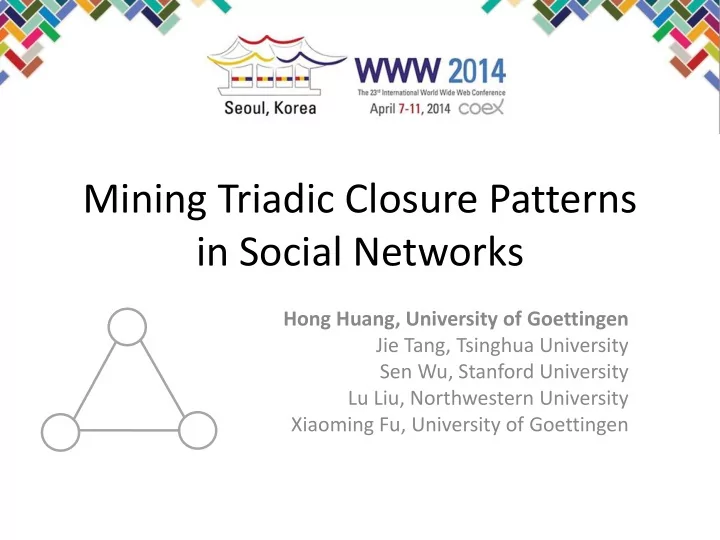

Mining Triadic Closure Patterns in Social Networks Hong Huang, University of Goettingen Jie Tang, Tsinghua University Sen Wu, Stanford University Lu Liu, Northwestern University Xiaoming Fu, University of Goettingen
Networked World • 1.26 billion users • 700 billion minutes/month • 280 million users • 80% of users are 80- 90’s • 555 million users • .5 billion tweets/day • 560 million users • influencing our daily life • 79 million users per month • 9.65 billion items/year • 800 million users • ~50% revenue from • 500 million users network life • 35 billion on 11/11 2/17
A Trillion Dollar Opportunity Social networks already become a bridge to connect our daily physical life and the virtual web space On2Off [1] [1] Online to Offline is trillion dollar business 3 http://techcrunch.com/2010/08/07/why-online2offline-commerce-is-a-trillion-dollar-opportunity/
“Triangle Laws” • Real social networks have a lot of triangles – Friends of friends are friends B • Any patterns? – 2X the friends, 2X the triangles? A C How many different structured triads can we have? 4 Christos Faloutsos’s keynote speech on Apr.9
Triads in networks 0 1 2 3 4 5 6 7 8 9 10 11 12 5 Milo R, Itzkovitz S, Kashtan N, et al.. Superfamilies of evolved and designed networks. Science, 2004
Triads in networks 0 1 2 3 4 5 6 7 8 9 10 11 12 6 Milo R, Itzkovitz S, Kashtan N, et al.. Superfamilies of evolved and designed networks. Science, 2004
Open Triad to Triadic Closure Open Triad Closed Triad 7
Open Triad to Triadic Closure Open Triad However, the formation mechanism is not clear… Closed Triad 8
Problem Formalization • Given network 𝐻 𝑢 = 𝑊, 𝐹 , 𝑍 𝑈 are candidate open triad: B • Goal: Predict the formation of 𝑢 1 𝑢 2 triadic closure 𝑔: ( 𝐻 𝑢 , 𝑍 𝑢 , 𝑌 𝑢 𝑢=1,…𝑈 ) → 𝑍 𝑈+1 A C 𝑢 3 𝑢 3 > 𝑢 2 > 𝑢 1 9
Dataset Time span: Aug 29 th , 2012 – 44 thousand Sep 29 th , 2012 newly formed closed triads per day 700 thousand Weibo nodes 360 thousand new links 400 million following 200 out-degree links per user 10
Observation - Network Topology Y-axis: probability that each open triad forms triadic closures 11
Observation - Demography 0 — female; 1 — male L(A, B) means A and B are from e.g., 001 means A and B are the same city female while C is male.
Observation - Demography 0 — female; 1 — male L(A, B) means A and B are from e.g., 001 means A and B are the same city female while C is male.
Observation - Social Role 0 — ordinary user 1 — opinion leader (top 1% PageRank) e.g., 001 means A and B are ordinary user while C is opinion leader. 14
Summary • Intuitions: – Men are more inclined to form triadic closure – Triads of opinion leaders themselves are more likely to be closed. – … • Correlation 15
Considered the intuitions and correlations… THE PROPOSED MODEL AND RESULTS 16
Triad Factor Graph (TriadFG) Model Correlation Factor h Latent Variable Attribute factor f Input network Map candidate open triads to nodes in model Example: Model Whether three users come from the same place? 17
Solution • Given a network 𝐻 = {𝑊, 𝐹, 𝑌, 𝑍} • Objective function: 𝜒 𝜄 = 𝑚𝑝𝑄 𝜄 (𝑍|𝑌, 𝐻) • 𝑄 𝑍 𝑌, 𝐻 ∝ 𝑄 𝑌 𝑍 ∙ 𝑄 𝑍 𝐻 attribute factor f 𝑈𝑠 𝑒 = 1 exp { 𝛽 𝑘 𝑔 𝑘 𝑦 𝑗𝑘 , 𝑧 𝑗 } 𝑎 1 𝑗=1 𝑘=1 ∙ 1 exp { 𝜈 𝑙 ℎ 𝑙 (𝑍 𝑈𝑠 𝑑 ) } 𝑎 2 𝑑 𝑙 • 𝜄 = ( 𝛽 𝑘 , {𝜈 𝑙 }) Correlation factor h 18
Learning Algorithm Lou T, Tang J, Hopcroft J, et al. Learning to predict reciprocity and triadic closure in social 19 networks[J]. ACM Transactions on Knowledge Discovery from Data (TKDD), 2013, 7(2): 5.
Results on the Weibo data • Baselines: SVM, Logistic Algorithm Precision Recall F1 Accuracy SVM 0.890 0.844 0.866 0.882 Logistic 0.882 0.913 0.897 0.885 TriadFG 0.901 0.953 0.926 0.931 20
Factor Contribution Analysis • Demography(D) • Popularity(S) • Network Topology(N) • Structural hole (H) 21
Conclusion • Problem : Triadic closure formation prediction B • Observations – Network Topology – Demography – Social Role A C ? • Solution : TriadFG model • Future work 22
23
Attribute factor Definition Feature Function Network topology Is open triad 5/2/0/4/1/3 1/1/1/1/0/0 Demography A,B,C from the same place 1 A,C from the same place 1 C is female 1 B is female 1 Social role A/B/C is popular user 1/0/1 A,B,C are all popular user 1 Two users are popular 1 One user is popular 1 A/B/C is structural hole spanner 1/0/1 Two users are structural hole spanner 1 One user is structural hole spanner 1 25
Structural hole • When two separate clusters possess non- redundant information, there is said to be a structural hole between them 26
Observation - Social Role 0 — ordinary user; 1 — opinion 0 — ordinary user; 1 — structural leader hole spanner e.g., 001 means A and B are e.g., 001 means A and B are ordinary user while C is opinion ordinary user while C is leader. structural hole spanner . Lou T, Tang J. Mining structural hole spanners through information diffusion in social networks, 27 www2013
Popular users in Weibo vs. Twitter • The rich get richer (Both) – 𝑄 1𝑌𝑌 > 𝑄(0𝑌𝑌) , validates preferential attachment • In twitter, popular users functions in triadic closure formation, while in Weibo reverse – In Twitter, 𝑄 𝑌1𝑌 > 𝑄(𝑌0𝑌) – In Weibo, ordinary users have more chances to connect other users. • Popular users in China are more close 28
Qualitative Case Study 29
Recommend
More recommend